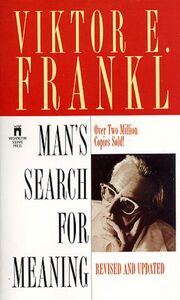Assessment |
Biopsychology |
Comparative |
Cognitive |
Developmental |
Language |
Individual differences |
Personality |
Philosophy |
Social |
Methods |
Statistics |
Clinical |
Educational |
Industrial |
Professional items |
World psychology |
Psychology: Debates · Journals · Psychologists

Man's search for meaning
Viktor Emil Frankl, M.D., Ph.D., (March 26, 1905 - September 2, 1997) was an Austrian neurologist and psychiatrist. Frankl was the founder of logotherapy and Existential Analysis, the "Third Viennese School" of psychotherapy. His book Man's Search for Meaning (first published in 1946) chronicles his experiences as a concentration camp inmate and describes his psychotherapeutic method of finding a reason to live. He was one of the key figures in existential therapy.
Life before 1945[]
Frankl was born in Vienna. Frankl's interest for psychology surfaced early in his life. For the final exam (Matura) in high school he wrote a paper on the psychology of philosophical thinking. After he graduated from high school in 1923, he studied medicine at the University of Vienna and later specialized in neurology and psychiatry. From 1933 to 1937 he headed the so-called "Selbstmörderpavillon" (suicide pavilion) of the General Hospital in Vienna and from 1937 to 1940 he privately practiced psychiatry. From 1940 to 1942 he headed the neurological department of the Rothschild hospital (at this point of time this hospital was the only one left in Vienna where Jews were admitted).
In December 1941 he married Tilly Grosser. In Autumn 1942 he, his wife and his parents were deported to the concentration camp of Theresienstadt. In 1944 he was transported to Auschwitz and later to Kaufering and Türkheim, two concentration camps adjunct to the KZ Dachau. He was liberated on April 27th 1945 by the US Army.
Frankl survived the Holocaust, but his wife, father and mother were murdered in concentration camps (among his immediate relatives, only his sister, who had emigrated to Australia, survived). It was due to his (and others') suffering in these camps that he came to the conclusion that even in the most absurd, painful and dehumanised situation, life has meaning and therefore even suffering is meaningful. This conclusion served as a strong basis of Frankl's later creation of logotherapy.
Life after 1945[]
Liberated after 3 years of life in concentration camps he returned to Vienna. During 1945 he wrote his world famous book titled "Ein Psychologe erlebt das Konzentrationslager" (English title: Man's Search for Meaning), wherein he tried to objectively describe the life of an ordinary concentration camp inmate from the perspective of a psychiatrist. In 1946 he was appointed to run the Vienna Poliklinik of neurologics, where he worked until 1971.
In the post-war years Frankl published more than 30 books and is most notably known as the founder of logotherapy (logos is Greek for word, reason, principle). He gave guest lectures and seminars all over the world and received 29 honorary doctor degrees.
Frankl died September 2nd, 1997, in Vienna.
Miscellaneous[]
- Frankl coined the term "existentialism."
- Frankl often said that even within the narrow boundaries of the concentration camps he got to know only two kinds of men: decent and non-decent ones.
- Frankl once recommended the Statue of Liberty on the east coast be complemented by a Statue of Responsibility on the west coast.
Quote[]
- Since Auschwitz we know what man is capable of. And since Hiroshima we know what is at stake.
- We must remain aware of the fact that as long as absolute truth is not accessible to us (and it never will be), relative truths have to function as mutual correctives. Approaching the one truth from various sides, sometimes even in opposite directions, we cannot attain it, but we may at least encircle it.
- "Ultimately, man should not ask what the meaning of his life is, but rather must recognize that it is he who is asked. In a word, each man is questioned by life; and he can only answer to life by answering for his own life; to life he can only respond by being responsible.
- We who lived in concentration camps can remember the men who walked through the huts comforting others, giving away their last piece of bread. They may have been few in number, but they offer sufficient proof that everything can be taken from a man but one thing: the last of the human freedoms -- to choose one's attitude in any given set of circumstances, to choose one's own way.
- "If all men were perfect, then every individual would be replaceable by anyone else. From the very imperfection of men follows the indispensability and inexchangeability of each individual" - The Doctor and the Soul
Bibliography[]
- Man's Search for Meaning. An Introduction to Logotherapy, Boston: Beacon, ISBN 0-8070-1426-5; and Random House / Rider, London 2004, ISBN 1-8441-3239-0; also: Washington Square Press; ISBN 0-67102-3373 (Softcover, December 1997)
- On the Theory and Therapy of Mental Disorders. An Introduction to Logotherapy and Existential Analysis, Translated by James M. DuBois. Brunner-Routledge, London-New York 2004. ISBN 0415950295
- Psychotherapy and Existentialism. Selected Papers on Logotherapy, New York: Simon & Schuster
- The Will to Meaning. Foundations and Applications of Logotherapy, New York: New American Library, ISBN 0-452-01034-9
See also[]
- List of Austrian Scientists
- List of Austrians
External links[]
- Biography at Vienna University
- Biography at Shippensburg University
- Viktor Emil Frankl - Man's Search for Meaning
| This page uses Creative Commons Licensed content from Wikipedia (view authors). |